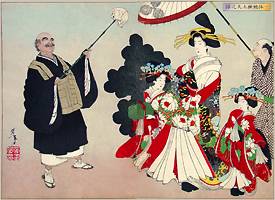“The autumn breeze of a single night of love is better than a hundred thousand years of sitting meditation.” Ikkyu
(translated by John Stevens)
Ikkyu Sojun died on this day, the 21st of November, in 1481, five hundred and thirty-eight years ago. There is no doubt these more than five hundred years have not diminished his importance.
Ikkyu was one of the singular figures of Japanese Zen. And he is of enormous importance to those of us committed to rooting Zen in the West.
Ikkyu was born in the suburbs of Kyoto in 1394. He was possibly an illegitimate child of the emperor and a courtier. At this point no one can know with any certainty. Whatever the truth of that matter, he was a person of interest to the court. And at the age of five he was placed in a Rinzai monastery.
At thirteen Ikkyu entered Kenninji shortly after which began a period of wandering from temple to temple and teacher to teacher. This was neither unusual nor particularly usual in these days. Many, perhaps most committed to a single monastery, but others, especially those committed to finding the great matter of life and death wandered in search of a right teacher.
He eventually settled into study with master Kaso at a branch temple of Daitokuji. After deeply investigating the koan system and with that his own heart, and plumbing the depths of the mystery, Ikkyu received dharma transmission from Kaso.
From there he began another period of wandering. This was a more common event for those who had completed the formal aspect of Rinzai Zen training.
That acknowledgement of his formal training, Ikkyu was not an example of a common or even normative Zen priest. He was an eccentric, best known to drink and carouse while at the same time a wildly devoted practitioner of zazen. His poetry was widely read.
Studying texts and stiff meditation can make you lose your Original Mind.
A solitary tune by a fisherman, though, can be an invaluable treasure.
Dusk rain on the river, the moon peeking in and out of the clouds;
Elegant beyond words, he chants his songs night after night.
(translator John Stevens)
He is held up as an example of “crazy wisdom.”
Frankly, I’m past wary of “crazy wisdom.” It can easily be argued figures in the West standing in that “tradition,” if we can use that term for those who walk their own idiosyncratic paths, frankly, most of them often did at least as much harm as they did good. And, I’m leaning toward more. Crazy wisdom by itself is problematic.
But, and I think this is terribly important, as a current within something larger, not the main show, sometimes magic happens. Or, at least, can. And, Ikkyu is an example of that magic.
Me, I find it terribly important to note how later in his life he was elected abbot of Daitokuji, and was critically important in preserving the monastery during some very hard, hard times.
I love how Ikkyu is often credited with bringing the tea ceremony and Zen together in an unambiguous way. I might be true, and even if not a historical truth, the myth is important.
Also, he had a long term love-affair with the blind singer Mori. This blending of the Zen way and an intimate relationship feels important. Especially as how later he would write:
The tree was barren of leaves but you brought a new spring.
Long green sprouts, verdant flowers, fresh promise.
Mori, if I ever forget my profound gratitude to you,
Let me burn in hell forever.
(translator uncertain, from Allpoetry.com)
Small wonder he picked up the popular nickname, Kyoun, “crazy cloud.” Crazy wisdom, no doubt. But, something else in that wandering about cloud…
Through most of his life he avoided the Zen institutions. But. as I noted, late in his life Ikkyu was elected head of Daitokuji. The monastery had been ravaged in a terrible civil war, and lay in ruins. With skills few expected he possessed, he devoted himself to the restoration of the monastery. It would become a central institution for the transmission of the Rinzai school.
After his death Ikkyu grew in legend to become a major folk figure including as a sort of trickster figure tweaking authorities while at the same time offering something deep and true. Certain works for me.
After all, he would sing to us…
My life has been devoted to love play;
I’ve no regrets about being tangled in red thread from head to foot,
Nor am I ashamed to have spent my days as a Crazy Cloud—
But I sure don’t like this long, long bitter autumn of no good sex!
Follow the rule of celibacy blindly and you are no more than an ass;
Break it and you are only human.
The spirit of Zen is manifest in ways countless as the sands of the Ganges.
Every newborn is a fruit of the conjugal bond.
For how many eons have secret blossoms been budding and fading?
(translation by John Stevens)
Thank you to the Bodhisattva Ikkyu…
Endless bows…













